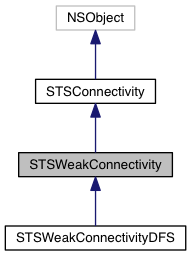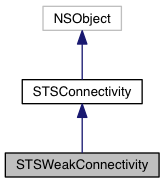WeakConnectivity class. More...


Instance Methods | |
| (void) | - addEdgeType: |
| Allows connectivity through edges of the given type. More... | |
| (void) | - addAllEdgeTypes |
| Allows connectivity through all edge types of the graph. More... | |
| (void) | - addNodeType: |
| Allows connectivity through nodes of the given type. More... | |
| (void) | - addAllNodeTypes |
| Allows connectivity through all node types of the graph. | |
| (void) | - excludeNodes: |
| Set which nodes can't be used. More... | |
| (void) | - excludeEdges: |
| Set which edges can't be used. More... | |
| (STSConnectedComponents *) | - getConnectedComponents |
| Returns the results generated by the execution of the algorithm. More... | |
| (void) | - run |
| Runs the algorithm in order to find the connected components. More... | |
| (void) | - setMaterializedAttribute: |
| Creates a new common attribute type for all node types in the graph in order to store, persistently, the results related to the connected components found while executing this algorithm. More... | |
| (void) | - close |
| Closes the Connectivity instance. More... | |
| (BOOL) | - isClosed |
| Check if the Connectivity instance is closed. | |
Detailed Description
WeakConnectivity class.
Any class implementing this abstract class can be used to solve the problem of finding weakly connected components in an undirected graph or in a directed graph which will be considered as an undirected one.
It consists in finding components where every pair (u,v) of nodes contained in it has a path from u to v and from v to u.
It is possible to set some restrictions after constructing a new instance of this class and before running it in order to limit the results.
After the execution, we can retrieve the results stored in an instance of the ConnectedComponents class using the getConnectedComponents method.
Check out the 'Algorithms' section in the SPARKSEE User Manual for more details on this.
Method Documentation
| - (void) addAllEdgeTypes |
Allows connectivity through all edge types of the graph.
In a weak connectivity the edges can be used in Any direction.
| - (void) addEdgeType: | (int) | type |
Allows connectivity through edges of the given type.
In a weak connectivity the edges can be used in Any direction.
- Parameters
-
type [in] Edge type.
| - (void) addNodeType: | (int) | t |
Allows connectivity through nodes of the given type.
- Parameters
-
t null
| - (void) close |
Closes the Connectivity instance.
It must be called to ensure the integrity of all data.
| - (void) excludeEdges: | (STSObjects *) | edges |
Set which edges can't be used.
This will replace any previously specified set of excluded edges. Should only be used to exclude the usage of specific edges from allowed edge types because it's less efficient than not allowing an edge type.
- Parameters
-
edges [in] A set of edge identifiers that must be kept intact until the destruction of the class.
| - (void) excludeNodes: | (STSObjects *) | nodes |
Set which nodes can't be used.
This will replace any previously specified set of excluded nodes. Should only be used to exclude the usage of specific nodes from allowed node types because it's less efficient than not allowing a node type.
- Parameters
-
nodes [in] A set of node identifiers that must be kept intact until the destruction of the class.
| - (STSConnectedComponents*) getConnectedComponents |
Returns the results generated by the execution of the algorithm.
These results contain information related to the connected components found as the number of different components, the set of nodes contained in each component or many other data.
- Returns
- Returns an instance of the class ConnectedComponents which contain information related to the connected components found.
| - (void) run |
Runs the algorithm in order to find the connected components.
This method can be called only once.
Implemented in STSWeakConnectivityDFS, and STSStrongConnectivityGabow.
| - (void) setMaterializedAttribute: | (NSString *) | attributeName |
Creates a new common attribute type for all node types in the graph in order to store, persistently, the results related to the connected components found while executing this algorithm.
Whenever the user wants to retrieve the results, even when the graph has been closed and opened again, it is only necessary to create a new instance of the class ConnectedComponents indicating the graph and the name of the common attribute type which stores the results. This instance will have all the information related to the connected components found in the moment of the execution of the algorithm that stored this data.
It is possible to run the algorithm without specifying this parameter in order to avoid materializing the results of the execution.
- Parameters
-
attributeName [in] The name of the common attribute type for all node types in the graph which will store persistently the results generated by the execution of the algorithm.
The documentation for this class was generated from the following file:
- Sparksee.h
